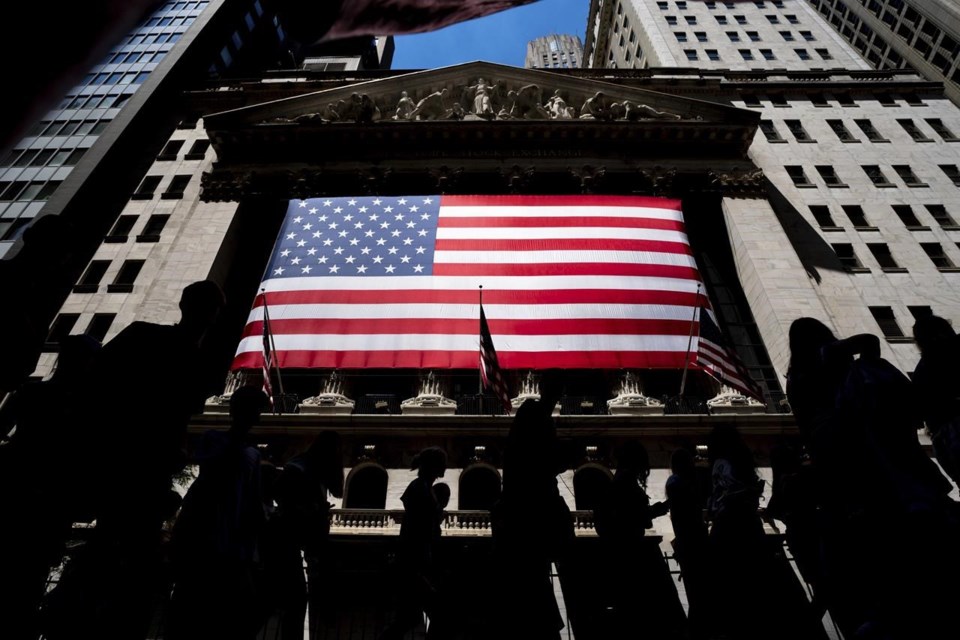NEW YORK (AP) — Wall Street rose to a rare gain Tuesday after Verizon, General Electric and other big companies reported fatter profits for the summer than expected.
The S&P 500 climbed 30.64, or 0.7%, to 4,247.68 to break a five-day losing streak. The Dow Jones Industrial Average gained 204.97 points, or 0.6%, to 33,141.38, and the Nasdaq composite rose 121.55, or 0.9%, to 13,139.87.
Verizon jumped 9.3% after saying it increased its number of broadband subscribers by 20% and earned more than analysts expected during the summer.
General Electric rallied 6.5% after delivering better-than-expected earnings and raising its profit forecast for the year. Coca-Cola rose 2.9% after it said growth in Mexico, India and other markets helped drive it to better profit during the summer than analysts expected.
The pace is picking up for companies to report their results for the summer, with more than 30% of companies in the S&P 500 on the schedule for this week. The broad hope is for S&P 500 companies to report the first growth in earnings per share in a year.
Such strength is crucial for the stock market to stabilize. It’s been mostly struggling since the summer under the weight of much higher yields in the bond market.
The 10-year Treasury yield has been rising rapidly from less than 3.50% in the spring and catching up with the Federal Reserve’s main overnight interest rate, which is at its highest level since 2001. The Fed has yanked its federal funds rate above 5.25% in hopes of starving high inflation of its fuel, and it’s indicated plans to hold the rate at a high level for a while.
High yields hurt prices for stocks, cryptocurrencies and other investments. They also slow the economy bluntly and add stress for the entire financial system.
But the 10-year Treasury yield was easing Tuesday after hitting its highest level since 2007 a day before. The 10-year yield was at 4.82%, down from 4.85% late Monday. Another drop in oil prices helped to ease the pressure on inflation.
Some investors have recently begun saying yields may not have much higher to go.
“From here, our view is that we are now close to the peak in yields,” said Solita Marcelli, chief investment officer Americas of UBS Global Wealth Management.
She said that if yields were to move much higher at a quick pace, it would risk hurting the Treasury market and shake the financial system’s stability. She said the Federal Reserve could step in to help the market like it did in March, when high interest rates helped cause three high-profile collapses of U.S. banks.
To be sure, even if rates and yields climb no further, they’re still high enough that some investors are worried they’ll eventually drag the economy into a recession if the Fed holds pat.
Until now, the overall economy has remained remarkably resilient in the face of much higher interest rates. A solid job market and spending by U.S. households has helped keep the economy chugging along.
Strong data reports recently have driven expectations for the U.S. economy’s growth in the third quarter of the year sharply higher. Economists at Goldman Sachs, for example, have raised their forecast for the quarter’s growth to 4.6% from just 1.5% in mid-August.
A preliminary report on Tuesday said business activity is strengthening in October by more than economists expected. The report from S&P Global indicated demand for manufacturers improved for the first time since April.
While such strength has prevented a recession, it could also be giving inflation fuel and encouraging the Fed to keep rates high for longer. That in turn could lead to more weakness in the future.
Some warning signals are also lying within the strong run of corporate profit reports.
General Motors, for example, said it made more during the summer than analysts had forecast. But it also warned that strikes by its unionized workers are cutting sharply into its pretax earnings. GM stock fell 2.3% after drifting between gains and losses several times.
In stock markets abroad, indexes were mixed across Europe and Asia.
Stocks in Shanghai added 0.8% after trading near their lowest levels in several years on worries about a slump in the property market and a slowing economy.
In the oil market, prices fell again to take some more pressure off inflation. A barrel of benchmark U.S. oil dropped $1.75 to settle at $83.74. Brent crude, the international standard, fell $1.76, to $88.07 per barrel.
U.S. oil had been above $93 last month, and it's bounced up and down since then amid concerns that the latest Hamas-Israel war could lead to disruptions in supplies from Iran or other big oil-producing countries.
——
AP Business Writers Yuri Kageyama and Matt Ott contributed.
Stan Choe, The Associated Press



